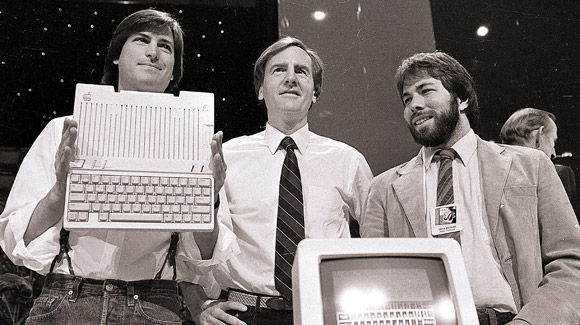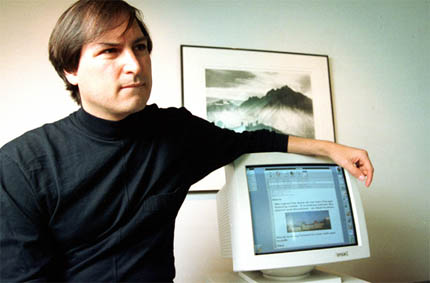Apple stages memorial for jobs; investors back to business
Investors get back to business, punishing Apple stock as iPhone sales slow.
Investors get back to business, punishing Apple stock as iPhone sales slow.
UPDATE Oct 20: Tens of thousands of Apple employees have tuned into a memorial service for Steve Jobs today, The Wall Street Journal reports.
Meanwhile, Apple has updated its tribute page, apple.com/stevejobs to include tributes.
For investors, it was back to business today.
Apple shares [NAS:AAPL], which dipped slightly then surged back to within pennies of their all time high in the fortnight following Mr Jobs' death, fell 5.59% today.
The company's quarterly result, released after the market closed yesterday, showed profit soaring 54% to a record $US6.62 billion, with quarterly revenue rising to $US28.27 billion.
However, iPhone sales slowed to 17 million from the previous quarter's 20.3 million.
Bullish analysts had been hopping for 20 million to 22 million.
Apple maintained the lull was simply consumers waiting for the new iPhone 4S, which sold four million in its first three days (which fell in the company's current quarter).
Apple sold 11.12 million iPads during the quarter, a 166% increase on 2010, and a 20% increase over the previous quarter.
The world is a little less insanely great
Oct 6 Apple co-founder Steve Jobs (56) has passed away. The news was broken on Apple's website at midday New Zealand time.
The company said Mr Jobs died peacefully today surrounded by his family.
"For those of us lucky enough to get to work with him, it's been an insanely great honor," Microsoft co-founder Bill Gates said in an email to media, appropriating one of the iconoclast's favourite phrases.
The Wall Street Journal's usually jaundiced Walter Mossberg added:
He was a historical figure on the scale of a Thomas Edison or a Henry Ford.
He did what a CEO should: Hired and inspired great people; managed for the long term, not the quarter or the short-term stock price; made big bets and took big risks.
He insisted on the highest product quality and on building things to delight and empower actual users, not intermediaries like corporate IT directors or wireless carriers.
And he could sell. Man, he could sell.

ABOVE (from left): Jobs, Sculley and Wozniak in 1984 - the year the Macintosh took personal computing into the mainstream. Within 12 months, the three had fallen out. Wozniak - then suffering from cancer - alleged Jobs was trying to dilute his share of the company; Sculley (in favour of swinging the axe) and Jobs sparred over layoffs as the market slowed.
Mr Jobs, who took several leaves of absence as he fought pancreatic cancer and received a liver transplant, resigned as Apple chief executive on August 25.
COO Tim Cook - who has served as acting CEO in 2004, the first half of 2009 and most of this year - was promoted to head the company.
Mr Jobs co-founded Apple with Steve Wozniak in 1976.
Along with Microsoft's Bill Gates, Oracle's Larry Ellison and others, he was part of a generation that recaste the IT industry, talking the concept of personal computers into the home and business mainstream.
Apple became a household name in 1984 with the release of the Macintosh, the first personal computer with a mouse-driven graphical user interface.
In 1985, Mr Jobs was forced out during power struggle with professional manager John Sculley (drafted from Pepsi). The company hit the doldrums as Mr Sculley combined listless product strategy with a failed attempt to partner with IBM and take the company in a more corporate direction.

ABOVE: Just as not every Apple product has been a runaway hit (history has quietly forgotten the Newton MessagePad), Mr Jobs did not always have the golden touch in business. NeXT Computer's "Cube" PCs, sold in the late 1980s and early 1990s, were a commercial failure. But other initiatives - at Pixar then later when he returned to Apple - paid off - helping the entrepreneur build a fortune estimated at $US8.3 billion. Mr Jobs is pictured in NeXT's board room during the 1980s.
One of Mr Jobs' companies from his wilderness years - Pixar Animation Studios, eventually sold to Disney in 2006 for $US7.4 billion - became a huge success. Another, NexT Computer, failed.
Apple bought NeXT in 1996 in a deal that saw Mr Jobs return to the fold as chief executive - first on an interim basis, then full time from 1998. The company teetered on the brink of bankruptcy during 1997 and 1998 before a minority investment from arch-foe Microsoft was negotiated.
Mr Jobs restructured the company, and a series of hit products followed.
The iPod, iPhone, iPad and the associated AppStore online service, which recently clocked its 18 billionth download, all created - or at least popularised - whole new classes of product.
It recently passed Exxon-Mobil to become the world's most valuable company, with a market cap around $US350 billion.
Steve Jobs is survived by his wife Laurene and four children.

ABOVE: Unveiling the first iPhone in January, 2007.
REMEMBERING STEVE JOBS
Wall Street Journal: Slideshow: Steve Jobs through the years
New York Times: Steve Jobs, Apple’s Visionary, Dies at 56
Reuters Factbox: Apple's history and milestones
MacWorld: The man who saved Apple
NEW CEO TIM COOK's EMAIL TO APPLE STAFF
Team,
I have some very sad news to share with all of you. Steve passed away earlier today.
Apple has lost a visionary and creative genius, and the world has lost an amazing human being. Those of us who have been fortunate enough to know and work with Steve have lost a dear friend and an inspiring mentor. Steve leaves behind a company that only he could have built, and his spirit will forever be the foundation of Apple.
We are planning a celebration of Steve’s extraordinary life for Apple employees that will take place soon. If you would like to share your thoughts, memories and condolences in the interim, you can simply email rememberingsteve@apple.com.
No words can adequately express our sadness at Steve’s death or our gratitude for the opportunity to work with him. We will honor his memory by dedicating ourselves to continuing the work he loved so much.
Tim